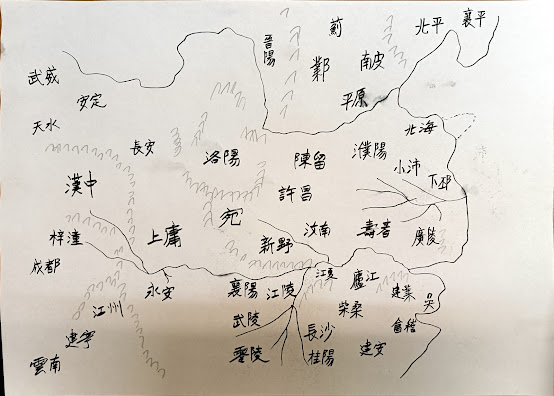借刀殺人3 二桃殺三士 晏子春秋 內篇 諫下
諸葛亮的梁父吟、李白的懼讒詩。
Killing with a Borrowed Knife 3
Two Peaches Killing Three Warriors
晏子春秋 內篇 諫下 Yanzi Chunqiu - Inner Chapters - Admonitions
諸葛亮的梁父吟 Zhuge Liang's Liangfu Song
李白的懼讒詩 Li Bai's Fear of Slander
晏子春秋,一書內有相關故事紀載;
The book Yanzi Chunqiu contains a related story;
晏子春秋 內篇 諫下: 春秋時,齊國宰相:晏嬰
Yanzi Chunqiu - Inner Chapters - Admonitions:
During the Spring and Autumn Period, the Prime Minister of Qi, Yan Ying,
向景公獻計,以二枚桃子賞賜給三名勇士:公孫接、田開疆、古冶子,
proposed a plan to reward three warriors with two peaches, Gongsun Jie, Tian Kaijiang, and Guyezi,
令其論功領賞,
ordering them to receive the reward based on their merits.
想要讓三個人因為彼此競爭獎勵,導致自相殘殺,
The plan was to encourage competition among the three for the reward, leading to mutual violence
避免權力過高的臣子挑戰君王,
and preventing powerful ministers from challenging the king.
讓三人互相攻伐,以除後患。
By having the three men attack each other, they would eliminate future trouble.
後來這三個人就如晏嬰預期的
As Yan Ying had predicted, the three men
因此別有用心的獎勵制度而互相爭鬥。
the three men fought each other due to the ulterior motive of the reward system.
此後就用來比喻:運用計謀除去某人。
From then on, this became a metaphor for using a scheme to get rid of someone.
三國時期的諸葛亮所寫作的梁父吟:「一朝被讒言,二桃殺三士。」
Zhuge Liang of the Three Kingdoms Era wrote in his poem "Song of Liangfu": "Once slandered, two peaches killed three warriors."
唐代的李白所寫作的懼讒詩:
Li Bai of the Tang Dynasty wrote in his poem "Fear of Slander":
「二桃殺三士,詎假劍如霜。
"Two peaches killed three warriors, how could a sword as frosty as frost be borrowed?
詎 ㄐㄩˋ : 怎麼能、豈能、為何能,用來表示反問的語氣。
眾女妒蛾眉,雙花競春芳。
Women envy her beautiful eyebrows, twin flowers vying for springtime beauty.
魏姝信鄭袖,掩袂對懷王。
Wei Shu trusted Zheng Xiu, concealing her sleeves as she faced King Huai.
一惑巧言子,朱顏成死傷。
Once deceived by a clever talker, her beautiful face was wounded.
行將泣團扇,慼慼愁人腸。」
I am about to weep over my round fan, my heart filled with sorrow."
二桃殺三士,借刀殺人。
Two peaches killed three warriors, using a borrowed knife to kill.
借刀殺人3 二桃殺三士 晏子春秋 內篇 諫下
晏子春秋,一書內有相關故事紀載;內篇 諫下 :
春秋時,齊國國王:齊景公,
擔心自己國內的三名勇士:公孫接、田開疆、古冶子,
因為權力越來越大,可能權力過大。影響到自己的權力與統治。
齊國國王:齊景公,向齊國宰相:晏嬰,尋求解決的辦法。
齊國宰相:晏嬰,向齊國國王:齊景公,獻上計策,
以二枚桃子賞賜給三名勇士:公孫接、田開疆、古冶子,
命令他們三個人,論功領賞,功勞最大的兩位,可以分享桃子。
因為人數有三位,桃子卻只有兩枚。
想要讓三個人,因為彼此競爭獎勵,導致自相殘殺,
從而避免權力過高的臣子,就然有可能挑戰君王的統治權。
用這樣的遊戲規則,讓:公孫接、田開疆、古冶子。
三人互相攻伐。齊國國王:齊景公。
打算利用這樣的方式,讓三個人彼此競爭,互相削弱,以除後患。
後來這三個人,就如:晏嬰,所預期的那樣。
因為彼此互不相讓,
三人果然因為這樣別有用心的獎勵制度,
而互相爭鬥、互相攻戰,彼此消亡。
此後,就用,二桃殺三士,來比喻:運用計謀殺人。
諸葛亮的梁父吟、李白的懼讒詩。有所描述:
三國時期的諸葛亮所寫作的梁父吟 :「一朝被讒言,二桃殺三士。」
唐代的李白所寫作的懼讒詩:「二桃殺三士,詎假劍如霜。眾女妒蛾眉,雙花競春芳。魏姝信鄭袖,掩袂對懷王。一惑巧言子,朱顏成死傷。行將泣團扇,慼慼愁人腸。」
二桃殺三士,借刀殺人。
Killing with a Borrowed Knife 3
Two Peaches Killing Three Warriors
晏子春秋 內篇 諫下 Yanzi Chunqiu - Inner Chapters - Admonitions
諸葛亮的梁父吟 Zhuge Liang's Liangfu Song
李白的懼讒詩 Li Bai's Fear of Slander
The book Yanzi Chunqiu contains a related story; <Inner Chapters> <Admonitions>: During the Spring and Autumn Period, the Prime Minister of Qi, Yan Ying, proposed a plan to reward three warriors, Gongsun Jie, Tian Kaijiang, and Guyezi, with two peaches, ordering them to receive the reward based on their merits. The plan was to encourage competition among the three for the reward, leading to mutual violence and preventing powerful ministers from challenging the king. By having the three men attack each other, they would eliminate future trouble. As Yan Ying had predicted, the three men fought each other due to the ulterior motive of the reward system. From then on, this became a metaphor for using a scheme to kill someone.
Zhuge Liang of the Three Kingdoms wrote in his poem "Song of Liangfu": "Once slandered, two peaches killed three warriors."
Li Bai of the Tang Dynasty wrote in his poem "Fear of Slander": "Two peaches killed three warriors, how could a sword as frosty as frost be borrowed? Women envy her beautiful eyebrows, twin flowers vying for springtime beauty. Wei Shu trusted Zheng Xiu, concealing her sleeves as she faced King Huai. Once deceived by a clever talker, her beautiful face was wounded. I am about to weep over my round fan, my heart filled with sorrow."
Two peaches killed three warriors, using a borrowed knife to kill.











